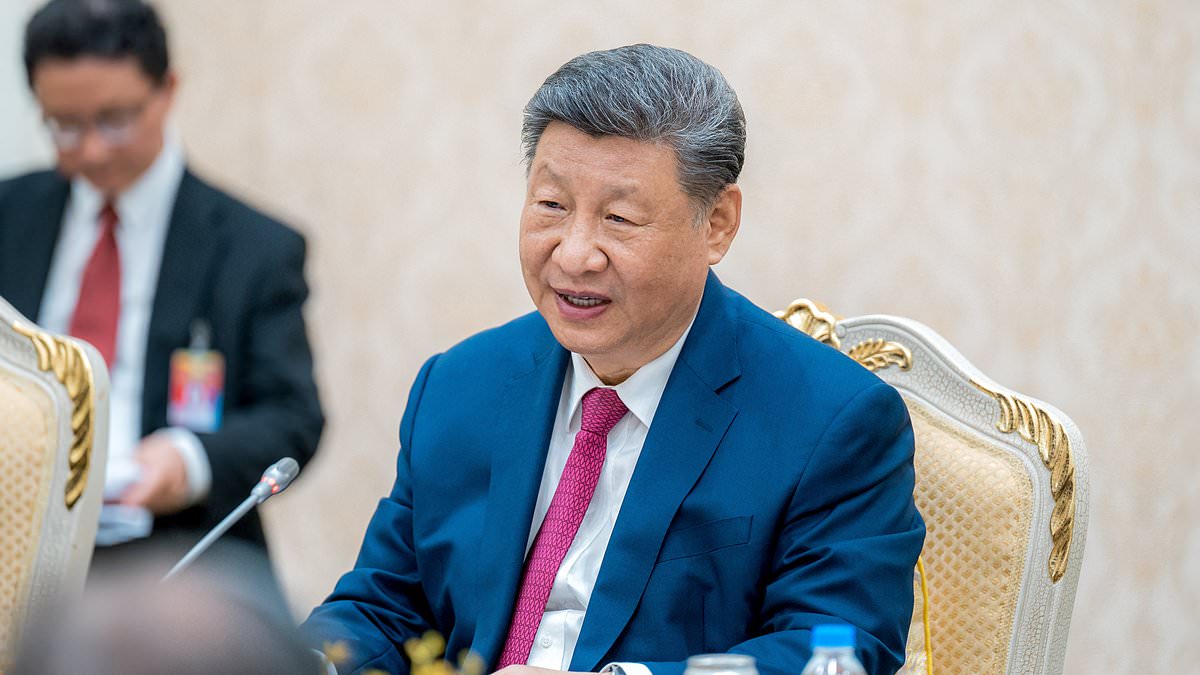The Pentagon discovered Chinese companies are aiding the Iran-backed Houthi rebels in Yemen to target American ships – a revelation that comes amid the fallout of President Donald Trump’s trade war.
A Chinese satellite company linked to Beijing’s military is helping the rebels with imagery to target US warships and international vessels in the Red Sea, the Financial Times reported.
The discovery comes amid a deepening trade war between the Washington and Beijing after President Trump slapped huge new tariffs on imports from China – up to 145 percent – backing President Xi Jinping into an economic corner.
Trump’s administration warned China that Chang Guang Satellite Technology Co Ltd, which has ties to the People’s Liberation Army, is providing the Houthis with this intelligence.
A state department official said China had ‘ignored’ the concerns.

In this image released by the U.S. Navy, the USS Mason (DDG 87), conducts maneuvers as part of a exercise in the Gulf of Oman; in October 2024 two missiles were fired at the USS Mason in the Red Sea, and officials believe they were launched by Yemen-based Houthi rebels
‘We can confirm the reporting that Chang Guang Satellite Technology Company Limited is directly supporting Iran-backed Houthi terrorist attacks on U.S. interests,’ State Department spokesperson Tammy Bruce told her regular news briefing.
‘China consistently attempts … to frame itself as a global peacemaker … however, it is clear that Beijing and China-based companies provide key economic and technical support to regimes like Russia, North Korea and Iran and its proxies,’ she said.
The Houthis are an armed political and religious group which champions Yemen’s Shia Muslim minority, the Zaidis.
The group, also backed by Tehran, have launched dozens of missile and drone attacks on commercial ships in the Red Sea, claiming these vessels are helping Israel.
Read More
Trump's four-word reaction on birthright citizenship being closer to reality

Many of the ships have ties to the United States or United Kingdom, which has the military from both countries on watch. U.S.-led naval forces have thwarted many attacks.
The attacks forced major shipping companies to stop using the Red Sea – through which almost 15 percent of global sea trade usually passes – and to take a much longer route around southern Africa, having to navigate around the Cape of Good Hope instead of passing through the Suez Canal.
Shipping traffic in the Red Sea has dropped 75%.
The detour around Africa adds an extra 10 to 14 days to the traditional 30 to 40-day voyage from Asia to Europe, leading to higher fuel costs, increased insurance premiums, and delays in deliveries.
And its raised the costs of goods on consumers.
The Houthi attacks have caused the biggest disruption to global trade since the Covid-19 pandemic.

Thousands of Houthi graduates who completed their military training, attend a military parade with their light and heavy weapons in Amran, Yemen on December 20, 2023
The revelation that China has ties to the attacks comes as relations between Washington and Beijing are at an all-time low.
Trump’s tariffs – and the reciprocal ones China slapped on American goods – risks collapsing a trade system worth $582 billion in 2024.
The tariffs on China are up to 245 percent, consisting of the 125 percent reciprocal tariffs; 20 percent fentanyl tariffs; and additional section 301 tariffs on specific goods.
Beijing, for its part, slapped the United States with levies of its own at 125 percent.
Americans could see the price of smartphones, computers and toys increase.
Trump put a 90-day pause on his tariffs for every nation but China. But those levies on other countries, even though they are capped at 10% until early July, threaten Chinese exports to third countries, like Vietnam, that ship goods on to U.S.
And the fallout has grown beyond economic repercussions.
China has warned its population to think twice before visiting the United States, told students to be careful about studying there, and cut back on the number of Hollywood films being shown in China.
But Trump downplayed any tensions.
‘We’re going to have a deal, I believe we’re going to have a deal with China, and if we don’t, we’re going to have a deal anyway, because we’re going to set a certain target, and that’s going to be it,’ the president told reporters in the Oval Office on Thursday.
He declined to say if he’s spoken with Xi directly.


President Donald Trump (left) would not say if he’s spoken directly with Chinese President Xi Jinping (right) as the trade war continues

A Chios Lion tanker ship in the Red Sea after an attack by the Houthis in July 2024
For his part, Xi went on a high-profile tour of Southeast Asia to make the case for free trade and promote his country as a source of ‘stability and certainty.’
Xi didn’t mention Trump by name but his message was clear: amid the turmoil Trump’s on-again, off-again tariffs are causing the global markets, investors should look to China as a safe bet.
During his stop in Vietnam, Xi said their two countries ‘have brought the world valuable stability and certainty’ in a ‘turbulent world.’
In other retaliatory moves, China suspended exports of certain rare earth minerals that are crucial for the world’s car, semiconductor and aerospace industries.
‘They’re concerning. And we’re thinking about all the options right now,’ Kevin Hassett, Trump’s national economic adviser, told reporters outside the White House on Monday. ‘Rare earths are a part of lots of the economy.’
‘The White House is concerned about China. Period,’ he added.
